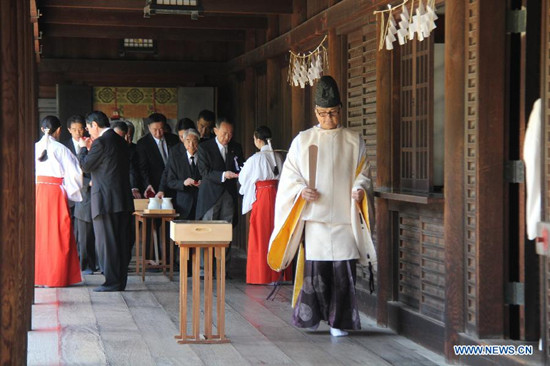
Japanese lawmakers visit the Yasukuni Shrine in Tokyo, Japan, Aug. 15, 2015.
"Seventy years on, large quantities of chemical weapons abandoned by Japan are still widely located in China. We urges Japan to accelerate the destruction of these weapons," Chen Xu, said Saturday, China's ambassador to The Netherlands and representative to the Organisation For the Prohibition of Chemical weapons (OPCW), said on Saturday.
The Chinese diplomat made this remark at the opening ceremony of a photo exhibition marking the 70th anniversary of the anti-Japanese war. A wide range of historical photos were displayed at an exhibition hall in Utrecht in central Netherlands, showcasing the efforts of overseas Chinese in the Chinese People's War of Resistance Against Japanese Aggression.
"During the war, the Japanese military used various chemical weapons in 18 Chinese provinces. After its capitulation, Japan abandoned large quantities of chemical weapons in China. Using and abandoning these weapons was one of many crimes during Japan's invasion of China," Chen told the press.
"Though the war has been over for decades, these weapons are still there in as many as 17 provinces in China. At the site of Harbaling area of China's Jilin Province, more than 300,000 pieces have been found," said the Chinese diplomat.
"Up till now, Japan has never provided specific information about their burial of chemical weapons which have caused quite a number of accidents involving casualties and injuries. These weapons still pose huge threats to Chinese people, property and the environment. They have proved to be more harmful than stockpile chemical weapons, which makes their destruction even more urgent," added Chen.
Japan invaded northeast China in September 1931. The full-scale invasion began on July 7, 1937. During the invasion, the Japanese launched many thousands of biological and chemical warfare attacks in many parts of China. The largest Japanese biological/chemical warfare laboratory was in Ping Fan, a small village near the city of Harbin, Heilongjiang Province in northeast China, known as Unit 731.
As to chemical warfare, Japan used poisonous gases more than 1,000 times in China. When WWII came to an end, Japan abandoned at least two million tonnes of chemical weapons at about 40 sites in China by burying them underground or dumping them in rivers, most of them in the three northeast provinces of Heilongjiang, Jilin and Liaoning.
In accordance with the Convention on the Banning of Chemical Weapons and the memorandum on the destruction of abandoned chemical weapons signed by China and Japan in 1999, Japan will offer all necessary funds, technology, expertise, facilities and China will provide assistance.
But the overall destruction pace of Japanese ACWs had been delayed twice and lags behind the schedule.
"China finds this situation deeply deplorable and worrying. The destruction of chemical weapons abandoned by Japan in China brooks no further delay. China urges Japan to increase its human and financial contribution to the destruction of weapons and achieve thorough destruction of those weapons at an early date," stressed the Chinese representative to the Hague-based OPCW.
"The OPCW should also consistently push for the chemical weapons destruction because this work constitutes the core objective of the Convention and the primary goal of the OPCW," added Chen.
The Chinese diplomat also criticized the Japanese Prime minister Shinzo Abe's war anniversary speech issued on Friday. Abe stopped short of direct apology, saying future generations should not have to keep apologizing for the sufferings caused by Japan's military past.
"As the international community marks the 70th anniversary of the victory of the Second World War, Japan should have made an explicit statement on the nature of the war of militarism and aggression and its responsibility on the wars, made sincere apology to the people of victim countries, and made a clean break with the past of militarist aggression, rather than being evasive on this major issue of principle," said Chen.


















































